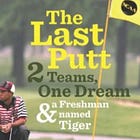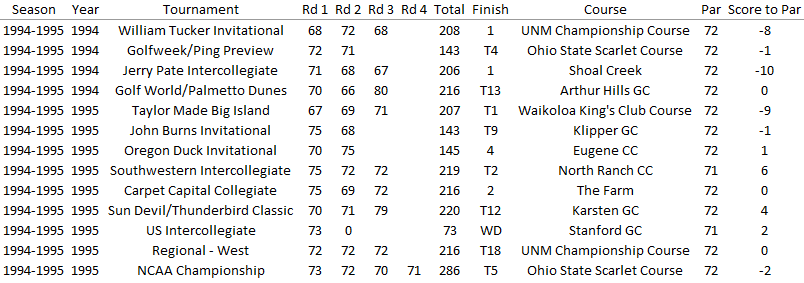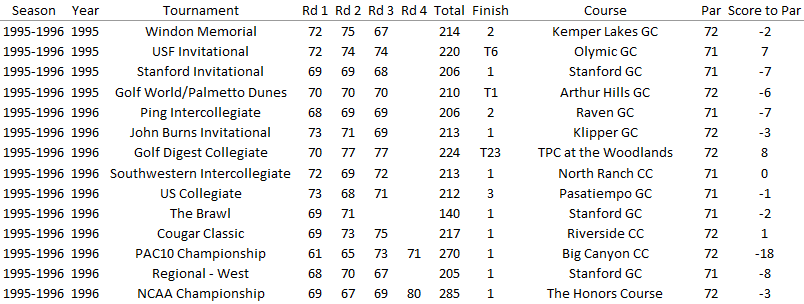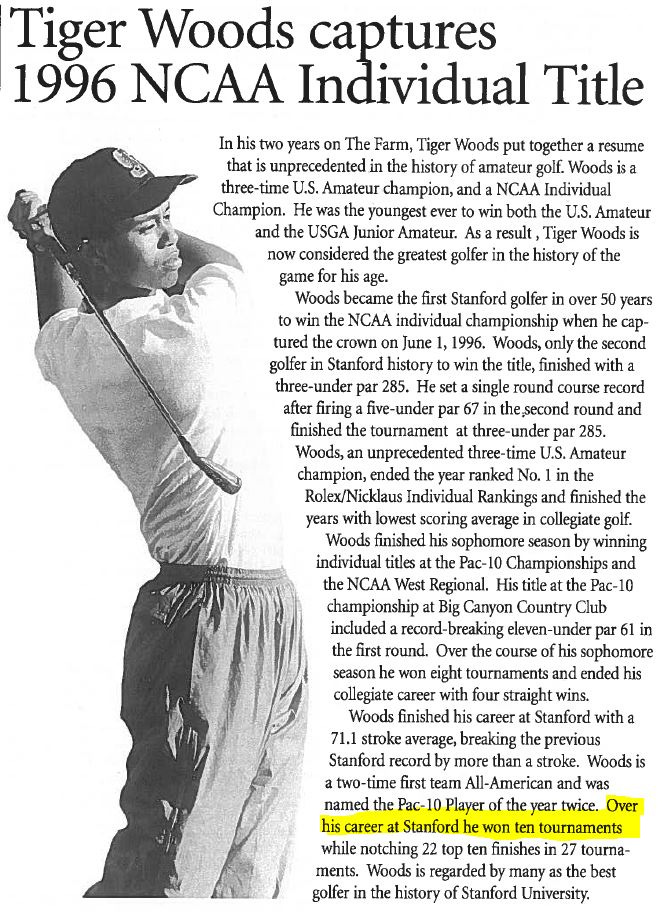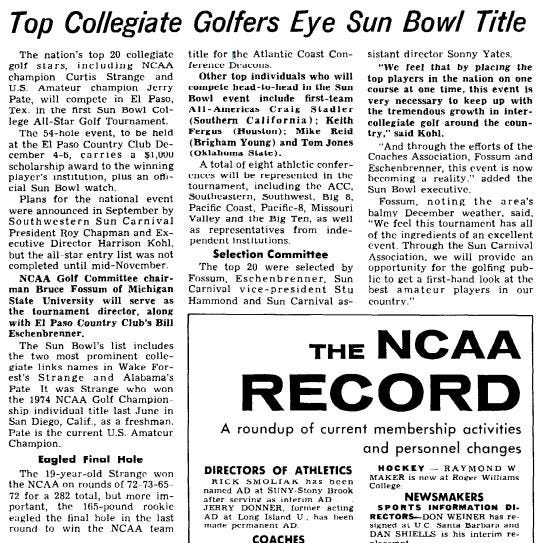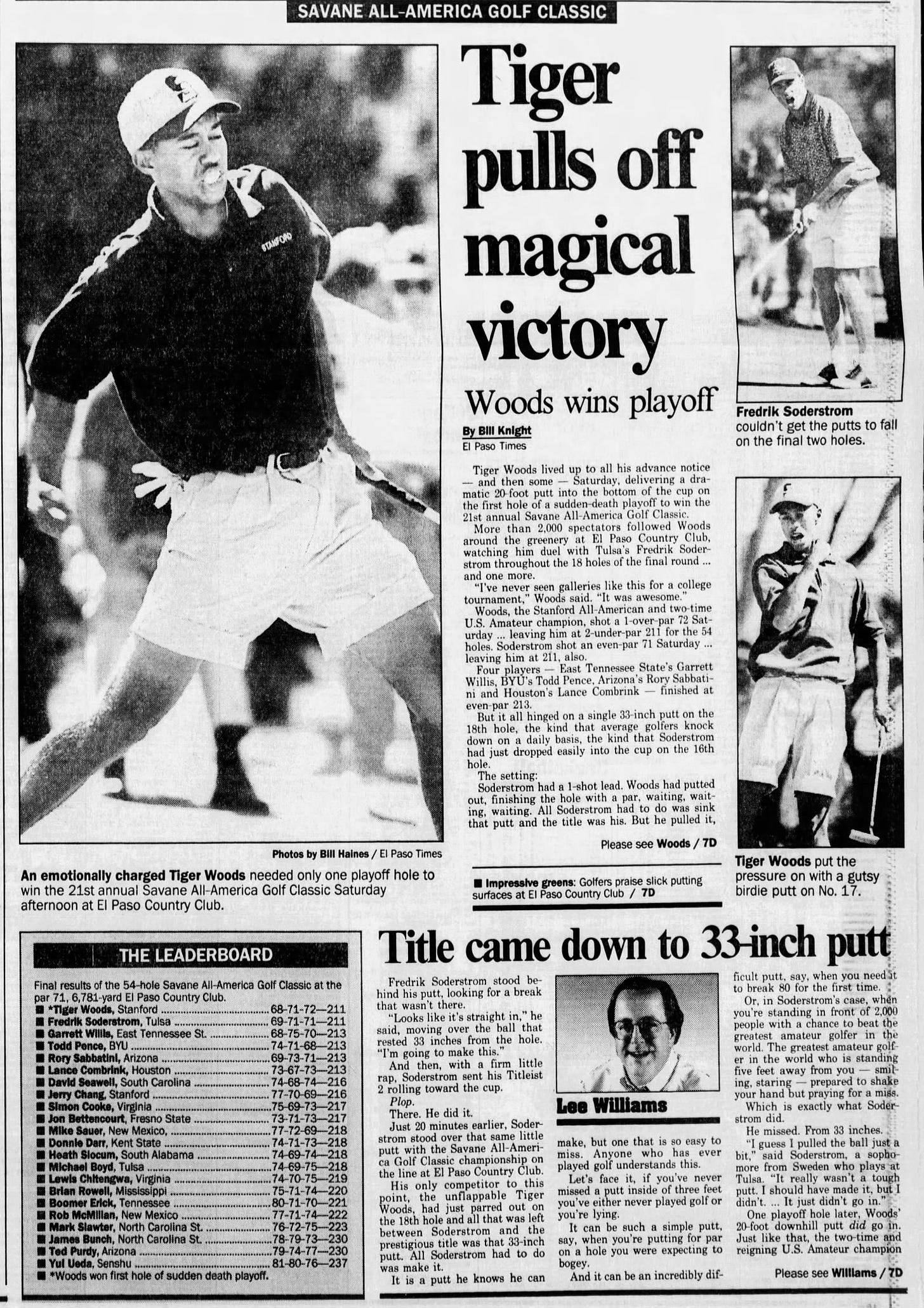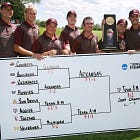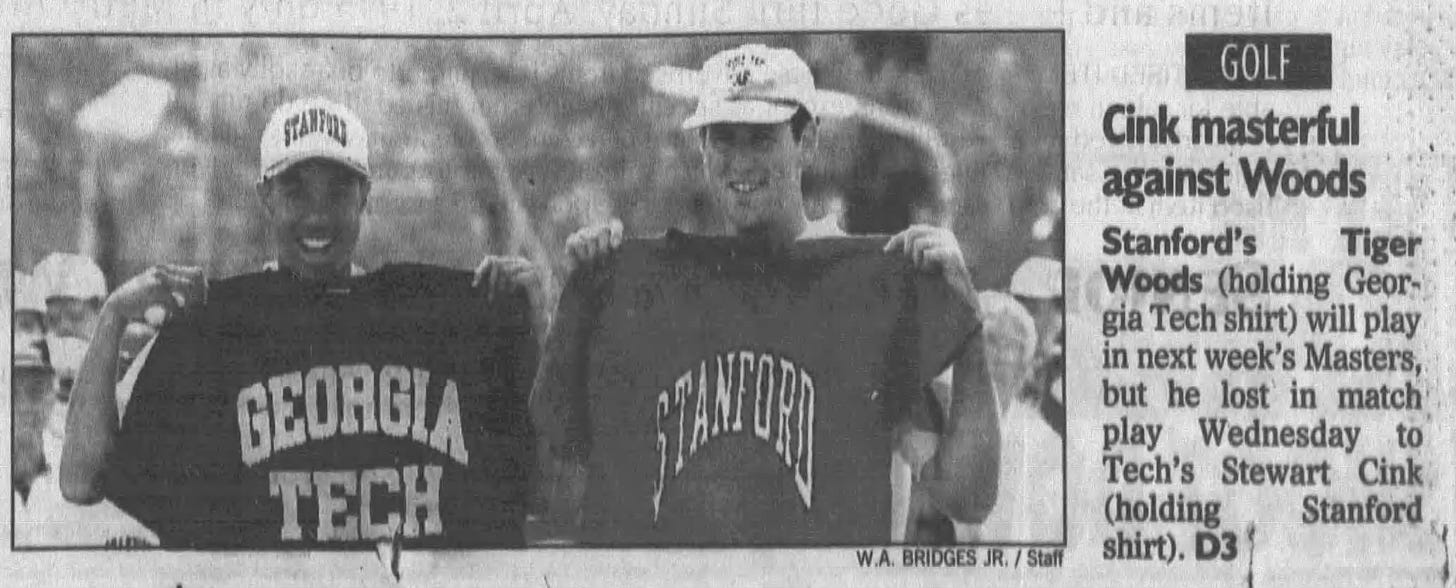TIGER WOODS HAS 11 COLLEGIATE WINS. RIGHT?
Note: This post is an expanded **and revised** version of the info covered in the “Extra Holes” section of our Men’s Championship Series post #20 that covers the 1995 championship. Also, underlined text is a link to a reference material and/or more details.
Undoubtedly, no golfer in history has been written about more than Tiger Woods. However, the majority of his collegiate career is largely unknown to even his biggest fans. Most people know about his incredible run of USGA championships, starting with three U.S. Junior Amateurs (1991-93) followed by his three U.S. Amateur titles (1994-96, the last of which came in his second/final year of college). Many know he won an individual NCAA title in 1996, but relatively few seem to know or remember just how close he and the Stanford team came to winning the 1995 title.
People do seem to remember, though, that Tiger racked up a school record 11 victories in his two seasons playing at Stanford. They might also remember that he did so in only 26 events, an impressive feat made even more incredible by the fact that it has since been equaled twice on the men’s side at Stanford by players who played one (Patrick Rodgers, 35 events) and two (Maverick McNealy, 45 events) more years than Tiger.
But this incredible record came to the forefront when a precocious Rose Zhang equaled that total in just 19 EVENTS and then bested that record with her (repeat) NCAA championship win in 2023. That win gave her 12 in only 20 events!!
So when you think of Stanford’s winningest male player, you think of Tiger Woods, who has 11 collegiate wins...right?
Inconsistencies In Tournament Data
It might seem like a straightforward task to confirm Tiger’s win total given all the coverage he generated while at Stanford. But things get a little confusing when trying to dive into his tournament data over those two years. We’ll do our best to highlight all of the inconsistencies from the various sources and speculate on what we think caused confusion.
**NOTE: We have reached out to all three of these sources, but despite the kind responses, have yet to receive any conclusive information after laying out the facts as we understand them below. Although based on truth and plenty of outside sources, our speculations are not definitive proof.
One commonly cited source on Tiger Woods’ Stanford results is from the wonderful treasure trove that is StanfordMensGolf.com. This website, organized and maintained using volunteer help from various alumni and long-time supporters of the program, has an incredible amount of stats and info that spans practically the entire existence of the (men’s) sport at Stanford. On their page dedicated to Tiger, the following graphic appears beneath a small writeup of Tiger’s accomplishments:
On the surface, this seems like the perfect summary of Tiger’s collegiate career stats including a breakdown of tournaments and even rounds played each season, scoring average, average vs par, etc. Aside from not having the individual tournaments listed, what’s the problem?
For starters, they have Tiger with 3 wins during the 1994-95 season. Utilizing various newspaper sources and the wonderful book The Last Putt by Neil Hayes and Brian Murphy, David was able to reconstruct the collection of tournament data which matches the table seen above in all details except the number of wins. It seems that this total includes Tiger’s co-medalist finish at the Big Island Intercollegiate in Feb 1995 where he lost a playoff to Arizona State’s Chris Hanell.
The 1995-96 data has its own interesting problem that is somewhat tied to that from the first season. Using the data from the 1996-97 Stanford golf media guide (which we’ll get to in a second) we can again get a matching dataset **if we don’t include the small 3-team 36-hole event called “The Brawl.” Taking out this event drops Tiger’s medalist count for the year to 7. HOWEVER, this can be brought back up to 8 if we include the co-medalist finish at the Golf World (Palmetto Dunes) Collegiate where Tiger again lost in a playoff, this time to Oklahoma’s Grant Masson.
So what does Stanford’s official records have to say about this? Although we haven’t been able to get an official response back from Stanford, the 1996-97 golf media guide - archived by StanfordMensGolf here - has a great breakdown of the entire 1995-96 season, as well as this interesting blurb which has Tiger listed with **10 wins in 27 events.
The number of events (27) includes 13 from the 1994-95 season and 14 from the 1995-96 season, all of which can be verified by outside sources such as newspaper clippings and archived GolfStat results, except The Brawl. It would seem that this event was official despite the fact that only 2 of the 3 teams completed all 36 holes of strokeplay, but it does not appear that it was used by GolfStat in computing the first-ever Golfstat Cup Rankings, which Tiger won with 8 wins over 13 events. Over the years, Golfstat has consistently credited players with wins when they co-medal, even if those events were later decided by a playoff, so this makes it consistent with the StanfordMensGolf website (including in number of rounds, scoring average, and average to par).
On the contrary, the Stanford media guide lists Tiger’s co-medalist finish at the Golf World Collegiate as a 2nd place finish, so their 10 total wins come from all **solo medalist finishes (2 in the 1994-95 season, 8 in 1995-96 including The Brawl).
What is the NCAA’s official position? They don’t seem to have many records saved outside of the NCAA championship, however, there is a page dedicated to Tiger’s collegiate career. On that page, the following section lists his collegiate victories:

Although they don’t have exact dates listed, this clearly shows that they don’t include the co-medalist “wins” from either event mentioned previously. Since the 1995 Stanford Invitational occurred during the 1995-96 season, the NCAA - which has been cited by countless articles since this page was created - has 2 victories listed in the 1994-95 season and **9 in the 1995-96 season in order to get up to the 11 win total. How can this be?? Well, it would appear that they have something additional called the “Tri-Match” which very clearly seems to be another name for (and seemingly a double counting of) “The Brawl”. Some might question whether such an event should even count in the total at all, but it definitely shouldn’t count twice.
Just for fun: what about the Sun Bowl All-America Golf Classic?
One of the many golf-related things ended by the COVID-19 shutdowns in 2020 was a premier collegiate event called the Sun Bowl All-America Golf Classic. Played annually around the end of the fall season, the Sun Bowl was one of those unique events that featured all college golfers playing as individuals. The winners list is an incredible collection of some of the most well-known players stretching all the way back to the first winner in 1974, Alabama’s legendary Jerry Pate.
Ironically, Tiger would win this event in 1995 (during the 95-96 season) in a playoff. Should this win count towards Tiger’s collegiate total? We have yet to find a team that counts a player’s victory in this event towards any kind of collegiate win total despite its association with collegiate golf in a way that few other amateur events have. The only thing similar would perhaps be the Patriot All-America event started in 2011.
Conclusion?
Given all of the above, we are taking it on the (current) fact that Tiger played in 27 official tournaments which resulted in the following:
Solo medalist (aka wins) in 10 events (37%)
Medalist/Co-Medalist in 12 (44%)
Finished first or second in 16 (59%)
Finished Top 5 in 20 (74%)
Finished Top 10 in 22 (81%)
Finished outside the Top 10 in only 4 (15%)
Withdrew from 1 event
What does this mean for the Stanford and NCAA record books, and college golf history in general? Truthfully, nothing — unless this is all confirmed by one or more of the sources listed above, and then...probably only a few things.
First and foremost, Rose Zhang is still the undisputed GOAT of Stanford golf (sorry, Tiger). Whether Tiger has 10 wins, or 11, or 12, Rose has 12 solo medalist victories that were won in fewer events - effectively surpassing Tiger. And when it comes to career lows, Tiger’s worst finish in two years was a T23 — Zhang’s was a T12.
On the men’s side, Patrick Rodgers and Maverick McNealy each have their win totals listed as 11 which includes various co-medals and playoffs (one even was a scorecard playoff!). It would appear that neither of them lost a playoff for medalist honors the way Tiger did, which would put them both ahead of Tiger on the list of “wins”.
From the NCAA perspective, Tiger’s career win total doesn’t impact the record books too much as that honor likely belongs to Phil Mickelson who racked up 16 wins in 4 seasons which *does not count his “T-1, lost playoff” events. Tiger does, however, have an interesting single-season record that hasn’t been completely confirmed due to incomplete college golf records. Like his career total, Tiger’s 8 wins in the 1995-96 season has been a statement of fact for a long time and was brought up again when NC State’s Matt Hill tied this total during his incredible 2008-09 season. By the way, Matt Hill’s total includes a win in a 4-team 18-hole event (“Big Four”) and co-medalist honors at Regionals (no playoff). Sound familiar?
At this point, we wouldn’t expect this information to be anything more than an interesting tidbit of college golf history. Perhaps, if anything, there’s a debate to be had on how to “count” co-medalist victories that were settled via some kind of playoff - such as is often the case for tournaments where an exemption into a pro event is on the line - but the fact remains that the players ended the event tied at the top which should at a minimum be recognized.
The Tournament Breakdown
Here is a breakdown of the 27 collegiate team tournaments Tiger played in while at Stanford, the 3 collegiate tournaments he missed, and the 1 individual-only collegiate tournament:
1994-95 Season
William H Tucker Intercollegiate = Medalist
Score of 208 was 3 strokes better than Alan Bratton [Oklahoma State]
Team title won by Oklahoma State, Stanford = 8th
Golfweek/Ping Preview (at Scarlet Course) = T4
Final round was cancelled by rain
Stewart Cink [Georgia Tech] won with 140
Casey Martin [Stanford] and Chris Riley [UNLV] T2 with 142
Tiger and three other players T4 at 143
Team title won by Stanford
Topy Cup in Japan = DID NOT PLAY
Was playing in the World Amateur Team Championship in France
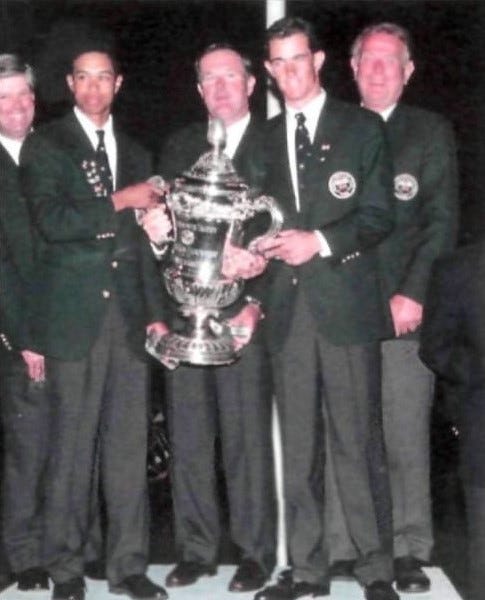
1994 US Team that won the Eisenhower Trophy (via Sports Illustrated) Chris Riley [UNLV] won individual
Team title won by UNLV, Stanford = 3rd
Jerry Pate Intercollegiate = Medalist
Score of 206 was 2 better than teammate Yanagisawa
Team title won by Stanford
Golf World/Palmetto Dunes = T13
Chris Tidland [Oklahoma St] won individual title over Stewart Cink [Georgia Tech]
Tiger shoots final round 80 to finish 8 shots back at 216
Oklahoma State won team title, Stanford = 2nd
Taylor Made Big Island (now Amer Ari) Intercollegiate = T1 *lost in playoff
Tied with Chris Hanell [Arizona State] at 207
Hanell sank birdie putt on 2nd playoff hole to Tiger’s par
Team title won by Oklahoma State, Stanford = 3rd
John Burns Intercollegiate = T9
Notah Begay [Stanford] won individual with 140 over Kris Cox [Ok State], Tim Beans [Arizona], and Mike Saver [New Mexico] at 141
Tiger tied with 3 others just 3 strokes back at 143
Team title won by Oklahoma State, Stanford = 3rd
Oregon Duck Invitational = 4th
Notah Begay’s 138 was 3 shots clear of Steve Woods [San Jose St] and 7 ahead of Tiger
Team title won by Stanford
Southwestern Intercollegiate = T2
Mike Walton [Pepperdine] won with 216 which was 3 better than a stellar group that included Tiger, Arron Oberholser [San Jose St], Todd Demsey [Arizona State], Jon Bettencourt [Fresno St], and Ted Snavely [Oregon]
Team title won by Stanford
Carpet Capital Collegiate = 2nd
Stewart Cink (212) betters Tiger by 4 strokes
Team title won by Georgia Tech, Stanford = 2nd
Stanford and Georgia Tech played an unofficial match ahead of the tournament with Stewart Cink getting the better of Tiger in their match
Sun Devil/Thunderbird Classic = T12
Todd Demsey [Arizona State] (213) won by one stroke over Tag Ridling [Arkansas], Chris Tidland [Ok St], and Chris Hanell [Arizona St]
Tiger and a group of 6 others were 7 shots back at 220
Team title won by Arkansas, Stanford = 6th
US Intercollegiate (hosted by Stanford) = WD
Tiger withdrew midway through the second round with a rotator cuff injury
Casey Martin [Stanford] won individual with 206, 3 strokes ahead of Charlie Wi [Cal]
Team title won by Stanford
PAC-10 Championship = DID NOT PLAY
Tiger was still recovering from his injured shoulder
Charlie Wi [Cal] (279) beats out Scott Johnson [Arizona St] by 5 strokes for the individual title
Arizona State wins the team title, Stanford = 8th
NCAA West Regional = T18
Mike Sauer [New Mexico] (208) outlasts Larry Barber [Arizona State] by a single stroke for the individual title
Arizona State wins the Regional title, Stanford = 6th
NCAA Championship = T5
Chip Spratlin [Auburn] hangs on for the individual title by a single stroke over Chris Tidland [Ok St] and Ted Purdy [Arizona], with Tiger only 3 strokes back
Oklahoma State and Stanford tied in regulation, but Ok St came away with the team title following a one-hole playoff
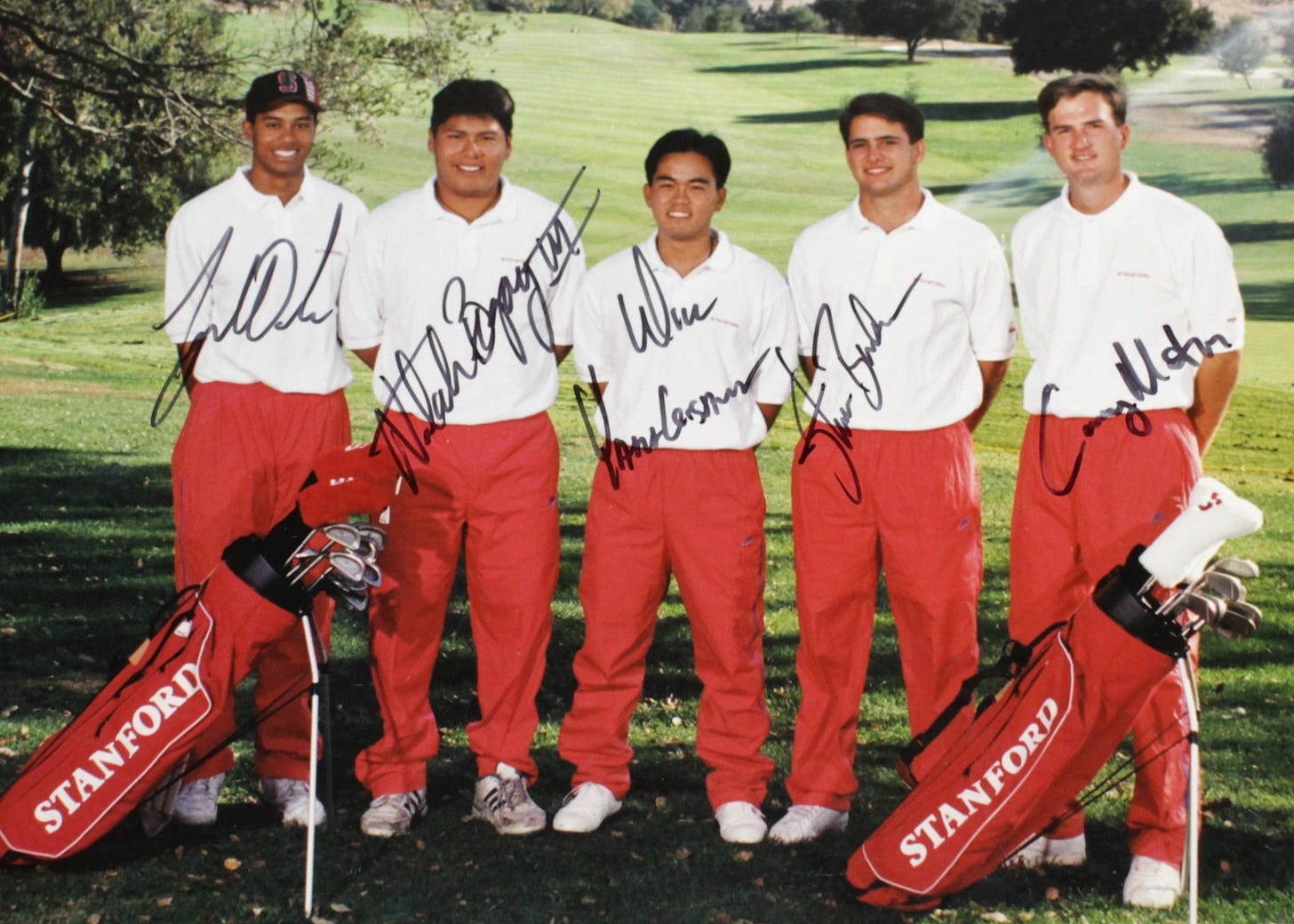
This signed photo of the 1994-95 Stanford team recently sold at auction for nearly $1k 1995-96 Season
Windon Memorial Classic = 2nd
Josh McCumber [Florida] shoots 212 to outlast Tiger who shot a final round 67 to fall just 2 short
Florida wins the team title, Stanford = 2nd
**Savane/Sun Bowl All-America Golf Classic = T1 *won playoff
Tournament for individuals only so does not count toward his total
Won a one-hole playoff over Fredrik Soderstrom [Tulsa]
U of San Francisco Invitational = T6
Tag Ridings [Arkansas] shot 214 to win by 3, Tiger finished 7 strokes back
Pepperdine won the team title, Stanford = 6th
Stanford Invitational = Medalist
Tiger shoots a final round 68 to retain his one-stroke lead over teammate Joel Kribel
Stanford wins the team title
Golf World/Palmetto Dunes = T1 *lost in playoff
Grant Masson [Oklahoma] sank two long putts to win in a playoff, first a bogey to tie in regulation then a birdie in the first playoff hole to win
ETSU wins the team title, Stanford = 12th
Ping Arizona Intercollegiate = 2nd
Ted Purdy [Arizona] (200) outduels Tiger (206) with a final round 65 to win by 6 strokes
Arizona wins the team title, Stanford = 2nd
John Burns Intercollegiate = Medalist
Tiger gets revenge over Grant Masson [Oklahoma] to win by 4
Auburn wins the team title, Stanford = 7th
Golf Digest Collegiate = T23
Chad Campbell [UNLV] wins by 1 over Robby Skinner [Texas], Tiger’s back-to-back 77s put him 10 strokes back
UNLV wins the team title, Stanford = T10
Southwestern Intercollegiate = Medalist
Tiger (213) wins by 3 over Joey Snyder [Arizona St]
Arizona State wins the team title, Stanford = T4
U.S. Collegiate = 3rd
Arron Oberholser [San Jose St] wins by 3 over Joel Kribel [Stanford], Tiger was 6 strokes back
Stanford wins the team title
U.S. Intercollegiate (hosted by Stanford) = DID NOT PLAY
Tiger was playing in the Masters (shot 75-75 to miss the cut by 4 strokes)
Joel Kribel [Stanford] wins by 2 over Matt Christensen [Fresno St]
Fresno St wins team title, Stanford = 5th
The Brawl / “Tri-Match” = Medalist
Tiger finished 4 shots ahead of teammates Joel Kribel and Jerry Chang
**This is a three-team 36-hole strokeplay event with the only info on the event found so far coming from Stanford’s 1996-97 media guide (see above)
Cougar Classic = Medalist
Tiger’s 75 on a day of high scores is good enough for a 3 shot win over Cam Osler [Colorado State]
Stanford won the team title
PAC-10 Championship = Medalist
Tiger’s record-setting 61 helps lead to 14 stroke victory over Birk Nelson [Oregon St] and Brian Hull [USC]
Arizona State wins the team title, Stanford = 4th
NCAA West Regional = Medalist
Tiger’s final round 67 opened up a 6-stroke victory over Mike Pavao [Hawaii]
Stanford wins the team title
NCAA Championship = Medalist
Tiger’s final round 80 was still good enough for a 4-shot victory over Rory Sabbatini [Arizona]
Arizona State won the team title, Stanford = 4th
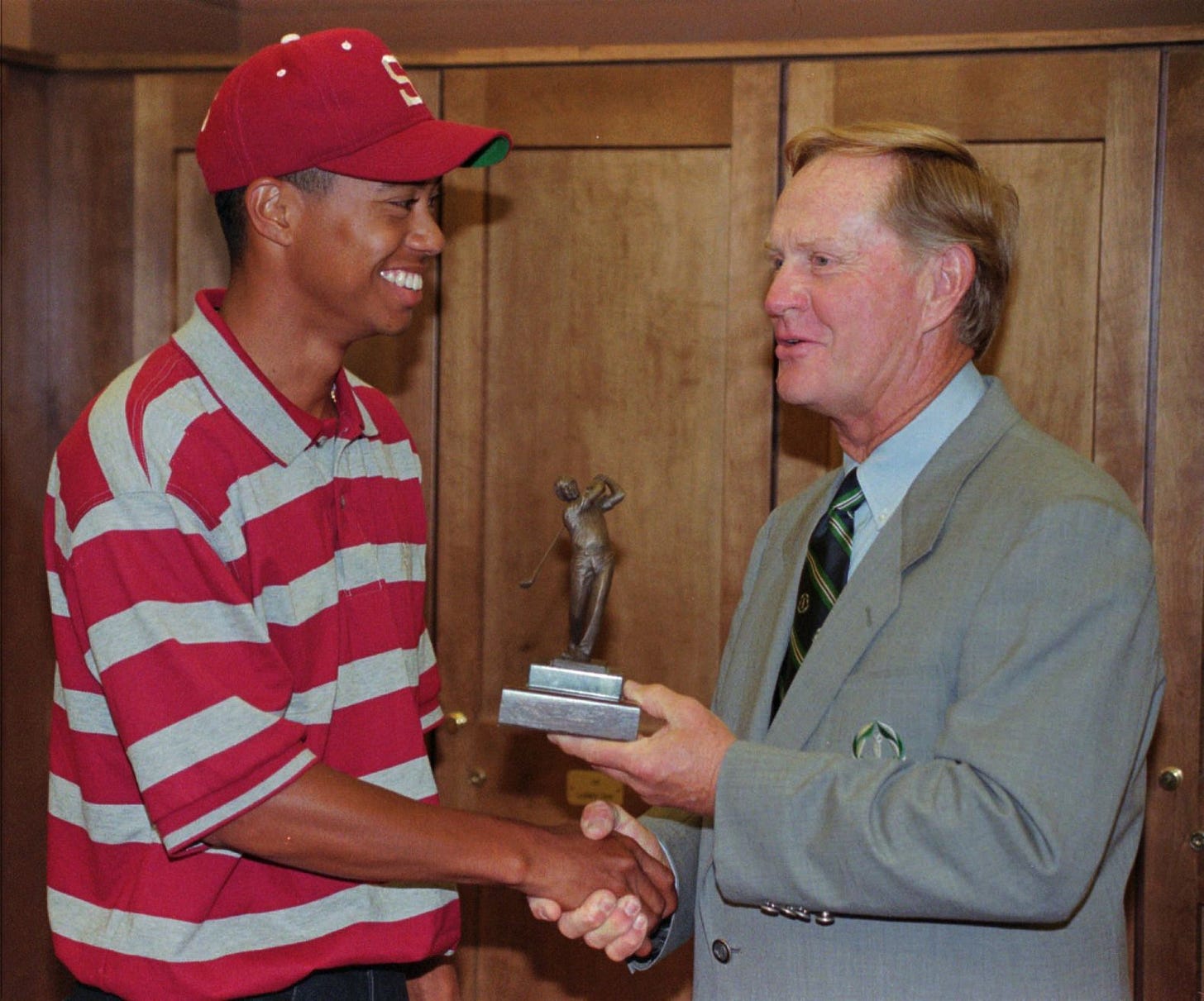
After his incredible sophomore season, Tiger was awarded several of the most prestigious college golf awards, including: Jack Nicklaus Award, Arnold Palmer Award, and Fred Haskins Award.
A few months later, Tiger would win his third straight U.S. Amateur title shortly before officially saying goodbye to college golf and “Hello world.”
Thanks for reading!






